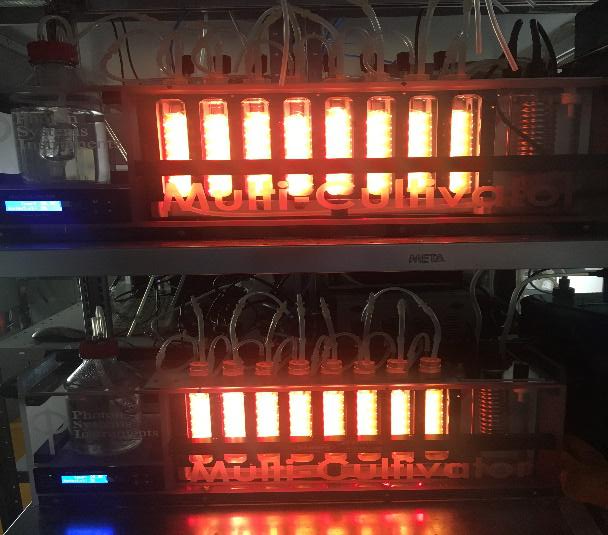Laboratory of Photosynthesis
Ondřej Prášil`s group
Microbial photosynthesis
The hunt for a clean and sustainable source of renewable energy
Metabolic engineering of microalgae to enhance lipid production
Introduction: The hunt for a clean and sustainable source of renewable energy is one of the pressing needs world is facing where microalgae may be a potential solution. Thus, study and research of microalgae as a feedstock for third generation renewable fuel source have gained interest with an objective to enhance their lipid yield. Lipids and carbohydrates are the prime storage molecules in microalgae, which lead to the production of biofuels. A thorough understanding of the primary metabolic pathways along with the associated enzymes is required to channel the flow of carbon and increase the availability of precursor molecules for lipid accumulation. We are using Nannochloropsis as model due to its high potential for lipid production (oleaginous) and suitability for mass cultivation. It has also been successful in homologous recombination attempts, genetic editing has been done, full genome sequence is known, several transcriptomic and proteomic studies have been carried out and genome & metabolic-scale models have been built. This genus is also well known source for producing omega-3 polyunsaturated fatty acids like EPA (eicosapentaenoic acid) which has neutraceutical values.
Approach: Microalgae hyper accumulate lipids (mainly TAG or storage lipid) when subjected to stress such as: high salinity, high light intensity and nitrogen starvation. TAG can be trans-esterified to produce transport-grade biodiesel. But as lipid per cell increases after stress (especially nitrogen starvation), total lipid content (mg/l) reduces as the cell division cease which leads to reduced lipid productivity due to low biomass. Thus, the trade-off between lipid and biomass needs to be resolved for optimum lipid yield to make the biofuel production sustainable and economic. Knowledge of enzymes and lipid regulators should reveal the crucial components of the lipid biosynthetic machinery that can possibly be utilized for trait improvement in microalgae for enhanced production of end products such as: triacylglycerol (TAG). The work shall include process engineering by initial optimization of cultivation condition for lipid induction. Finally, cellular metabolism would be intervened by generating mutant lines by using upcoming gene editing tools to identify the desired strain that can enable a stress-free production of lipid without biomass reduction i.e. uncoupling the biomass growth and stress.
 Fig.1 Closed-system programmable bubble-column multi-cultivator reactors would be used for our study that can simultaneously regulate various abiotic factors and provide real time data.
Fig.1 Closed-system programmable bubble-column multi-cultivator reactors would be used for our study that can simultaneously regulate various abiotic factors and provide real time data.
- Related publications:
- Banerjee, A., Guria, C., Maiti, S.K., Banerjee, C. and Shukla, P., 2019. Carbon bio-fixation, effect of physicochemical factors and carbon supply strategies by Nannochloropsis sp. using flue gas and fertilizer. Biomass and Bioenergy, 125, pp.95-104
- Jagadevan, S.*, Banerjee, A.*, Banerjee, C., Guria, C., Tiwari, R., Baweja, M. and Shukla, P., 2018. Recent developments in synthetic biology and metabolic engineering in microalgae towards biofuel production. Biotechnology for biofuels, 11(1), p.185. (* equal contribution).
- Banerjee, A., Banerjee, C., Negi, S., Chang, J.S. and Shukla, P. 2018. Improvements in algal lipid production: a systems biology and gene editing approach. Critical reviews in biotechnology, 38(3), pp.369-385.
- Liu, J., Song, Y. and Qiu, W., 2017. Oleaginous microalgae Nannochloropsis as a new model for biofuel production: review & analysis. Renewable and Sustainable Energy Reviews, 72, pp.154-162.
- Poliner, E., Farré, E.M. and Benning, C., 2018. Advanced genetic tools enable synthetic biology in the oleaginous microalgae Nannochloropsis sp. Plant cell reports, 37(10), pp.1383-1399.
- This project would be carried by Avik Banerjee (Ph.D) Web of Science Researcher ID: AAC-9325-2019; ORCID: 0000-0001-5992-0774